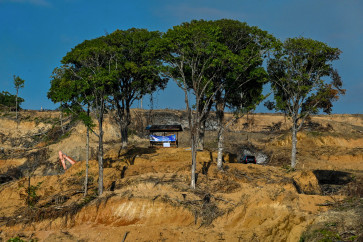Popular Reads
Top Results
Can't find what you're looking for?
View all search resultsPopular Reads
Top Results
Can't find what you're looking for?
View all search resultsStigma, violence continue to repress LGBTIQ groups
Equal rights: Members of the Lesbian Gay Bisexsual Transgender (LGBT) Forum campaigned against homophobia at Hotel Indonesia traffic circle (Bundaran HI) in Jakarta on Saturday
Change text size
Gift Premium Articles
to Anyone
E
span class="caption" style="width: 378px;">Equal rights: Members of the Lesbian Gay Bisexsual Transgender (LGBT) Forum campaigned against homophobia at Hotel Indonesia traffic circle (Bundaran HI) in Jakarta on Saturday. They urged the government to end LGBT discrimination in education, health care and the workplace. ANTARA/Yudhi Mahatma
Widespread and deeply rooted prejudice and discrimination continue to repress the freedom and confidence of lesbian, gay, bisexual, transgender and transsexual, intersex and questioning (LGBTIQ) people, activists say.
Hartoyo, the general secretary of Our Voice, an organization advocating for gay and bisexual men, said legal constrictions had stigmatized the minority groups’ communities in various regions.
“I’ve found at least 10 bylaws in several provinces such as South Sumatra and West Sumatra that classify transsexuals and homosexuals as prostitutes and therefore homosexuals can be criminalized,” he told reporters on Monday.
Hartoyo said that the 2008 Law on Pornography stipulated that homosexuality was a deviant sexual condition, and that this contradicted the Health Ministry’s Diagnostic Classification on Mental Disorder Guidelines, which stated that homosexuality was not a mental disorder.
The World Health Organization has since 1990 held that homosexuality is not a mental disease.
Donny Suryono of the LGBTIQ-Concerned Cross-Organization said that despite the high appreciation for humanity values cited in the 1945 Constitution and the five principles of Pancasila, the government still ignored violence and discrimination based on sexual orientation.
“Many companies dismiss LGBTIQ people who are open with their sexual orientation. Law enforcers often verbally abuse and publically humiliate homosexuals. Homosexuals also find it hard to assemble and express their opinions – they are always wary and feel anxious,” Donny said.
Donny said that most LGBTIQ organizations were under threat and were constantly on high alert whenever they assembled or held internal events.
“LGBTIQ people, both as individuals and groups are forced to be the victims of a governmental policy that cannot guarantee protection for every citizen,” he said.
Hartoyo said that the most common form of discrimination against LGBTIQ people was domestic violence, including discrimination, and sometimes physical abuse, by family members.
“There are so many homosexuals who become victims in their own families but they are reluctant to share their experiences because their families have made them believe that they are such an embarrassment, so they choose to keep the problem to themselves,” he said.
Therefore, in a joint-statement, an NGOs alliance calling themselves LGBTIQ-Concerned Organizations comprising more than 62 organizations in Indonesia demanded that the government provide protection for every citizen, regardless of their sexual orientation or gender identity. On May 17, LGBTIQ-Concerned Organizations commemorated 21 years of International Day Against Homophobia (IDAHO).
IDAHO was founded at the 2006 international homosexual and human rights activist conference in Montreal, Canada. (swd)










